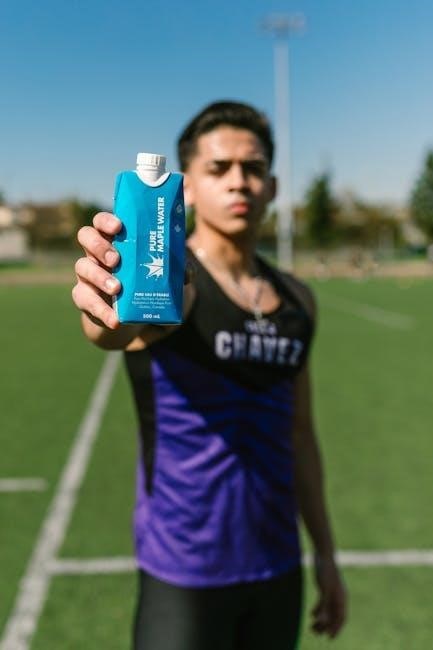A well-structured marathon training nutrition plan is crucial for optimizing performance, enhancing endurance, and supporting recovery. It ensures runners fuel their bodies effectively for peak race-day readiness.
1.1 Importance of Nutrition in Marathon Training
Nutrition plays a pivotal role in marathon training, directly impacting performance, recovery, and overall success. A well-planned diet ensures adequate energy levels, supports muscle repair, and enhances endurance. Proper fueling helps runners avoid fatigue, injuries, and mental fog, while also optimizing physical adaptation to training. Without a balanced nutrition strategy, even the most rigorous training efforts may fall short. Marathon runners require specific macronutrient ratios to sustain long runs and recover efficiently. Nutrition also influences gut health, immune function, and mental clarity—critical factors for race-day performance. Thus, prioritizing nutrition is essential for achieving peak conditioning and crossing the finish line strong.
1.2 Overview of a Marathon Training Nutrition Plan
A marathon training nutrition plan is a structured approach to fueling the body for optimal performance. It typically includes balanced macronutrient intake, with a focus on carbohydrates for energy, protein for muscle repair, and healthy fats for sustained fuel. Hydration strategies are also integral, ensuring proper fluid and electrolyte balance. The plan is tailored to individual needs, training phases, and dietary preferences, emphasizing whole foods, electrolytes, and practical fueling options for long runs. It also addresses pre- and post-workout nutrition to enhance recovery and performance. A well-structured plan helps runners avoid common issues like hitting the wall and supports overall health and race readiness.

Pre-Training Nutrition
Pre-training nutrition focuses on building a balanced diet rich in carbohydrates, proteins, and fats to enhance endurance and energy levels while supporting overall health and recovery.
2.1 Building a Base Diet for Endurance
Building a base diet for endurance is essential for marathon training. It focuses on balanced nutrition, ensuring adequate energy reserves and supporting long-term performance. Emphasize complex carbohydrates like whole grains, fruits, and vegetables, which provide sustained energy. Include lean proteins to repair and build muscle tissue, such as chicken, fish, and legumes. Healthy fats, including nuts and avocados, support hormone production and overall health. Hydration is also critical, with water and electrolyte-rich beverages maintaining fluid balance. A consistent eating schedule helps regulate energy levels, while avoiding excessive sugar and processed foods promotes optimal bodily function. Tailor portions to training demands, ensuring calorie intake matches expenditure for endurance building.
2.2 Role of Carbohydrates, Proteins, and Fats
Carbohydrates are the primary energy source for marathon training, comprising 55-65% of total calories. They fuel workouts and replenish glycogen stores. Proteins, at 15-20%, aid in muscle repair and recovery, while fats (20-25%) support hormone production and fat-soluble vitamin absorption. Balancing these macronutrients ensures sustained energy, recovery, and overall performance. Carbohydrates like whole grains and fruits provide fiber, while lean proteins such as chicken and fish support muscle integrity. Healthy fats from nuts and avocados enhance nutrient absorption. Tailoring these ratios to individual needs optimizes training efficiency, preventing fatigue and injury. Proper macronutrient balance is key to achieving peak endurance and recovery capabilities.
2.3 Hydration Strategies
Proper hydration is vital for marathon training, as even mild dehydration can impair performance. Aim to drink 8-10 glasses of water daily, adjusting for sweat loss. Pre-run hydration should start 24-48 hours in advance, with 16-20 ounces of fluid 1-2 hours before training. During long runs, consume 16-24 ounces of water or sports drink every 60-90 minutes to replenish electrolytes. Post-workout, rehydrate within 30 minutes to restore fluid balance. Monitor urine color for hydration status—pale yellow indicates proper levels. Avoid overhydration to prevent hyponatremia. Tailor intake to individual sweat rates and weather conditions for optimal performance and recovery.

Nutrition During Training
Nutrition during training fuels performance, aids endurance, and supports recovery. Focus on balanced intake, energy gels, and hydration to maintain energy levels and prevent overhydration.
3.1 Fueling for Long Runs
Fueling for long runs is essential to maintain energy levels and endurance. Aim for a balanced meal rich in carbs, protein, and fats 1-3 hours before running. Include complex carbs for sustained energy and lean proteins for muscle support. Avoid heavy, high-fiber foods that may cause digestive discomfort. During long runs, consume energy gels or snacks every 30-45 minutes to replenish glycogen stores. Stay hydrated with water or electrolyte-rich drinks to prevent dehydration. Practice race-day nutrition strategies during training to build familiarity and avoid stomach issues. Proper fueling enhances performance, delays fatigue, and supports overall training progress.
3.2 Mid-Workout Nutrition and Energy Gels
Mid-workout nutrition plays a key role in maintaining energy levels during long runs. Energy gels are a popular choice, providing a quick source of carbohydrates to replenish glycogen stores. Typically consumed every 30-45 minutes, they come in various flavors and with or without caffeine. For optimal absorption, take gels with water to avoid gastrointestinal distress. Other options include bananas, energy bars, or sports drinks. Experiment with different foods during training to determine what works best. Consistency is crucial to avoid energy crashes and maintain performance. Proper mid-run fueling helps sustain endurance, supports mental clarity, and enhances overall training efficiency.
3.3 Post-Workout Recovery Nutrition
Post-workout recovery nutrition is vital for repairing muscles and replenishing energy stores after intense training. Aim to consume a mix of carbohydrates and protein within 30-60 minutes post-exercise. Carbohydrates help restore glycogen levels, while protein supports muscle repair. A recovery shake with a 3:1 ratio of carbs to protein is ideal. Additionally, incorporate anti-inflammatory foods like berries, nuts, and whole grains to reduce muscle soreness. Staying hydrated is also crucial, so include electrolyte-rich beverages. A balanced recovery meal ensures your body rebuilds and adapts for the next training session, promoting long-term performance and reducing injury risk. Consistency in recovery nutrition enhances overall training adaptation and resilience;

Race-Specific Nutrition
Race-specific nutrition focuses on optimizing performance during the marathon. It includes pre-race meal planning, in-race fueling strategies, and post-race recovery to maximize endurance and minimize fatigue.
4.1 Pre-Race Meal Planning
Pre-race meal planning is essential to ensure optimal energy levels and prevent digestive discomfort. Aim to consume a balanced meal 12-24 hours before the race, focusing on high carbohydrates, moderate protein, and low fiber and fat. Examples include pasta, rice, or oatmeal with lean protein sources like chicken or fish. Avoid heavy, spicy, or unfamiliar foods to minimize stomach issues. Hydration should also be prioritized, with water or herbal teas. Practice your pre-race meal during long training runs to confirm it works for you. Avoid overeating to prevent bloating and ensure the meal aligns with your race-day schedule for peak performance.
4.2 Nutrition During the Marathon
Nutrition during the marathon is critical for maintaining energy levels and preventing fatigue. Aim to consume 30-60 grams of carbohydrates per hour, preferably from easily digestible sources like energy gels, bananas, or sports drinks. Hydration is equally important, with 400-800 ml of fluid per hour, adjusting based on weather conditions. Avoid overfueling, as it can lead to digestive issues. Practice your nutrition strategy during long training runs to ensure it works for your body. Stick to familiar foods and avoid trying anything new on race day to minimize risks of stomach discomfort and maintain consistent performance throughout the race.
4.3 Post-Race Recovery Nutrition
Post-race recovery nutrition is essential for replenishing energy stores, repairing muscles, and supporting overall recovery. Within 30-60 minutes after finishing, consume a mix of carbohydrates and proteins in a 3:1 ratio to replenish glycogen and repair muscle tissue. Examples include chocolate milk, a banana with peanut butter, or a recovery shake. Stay hydrated with water or electrolyte-rich drinks to rebalance fluids lost during the race; Aim for a balanced meal within 2-3 hours, including lean proteins, complex carbs, and vegetables. Incorporate anti-inflammatory foods like berries or oranges to aid recovery. Avoid excessive alcohol or heavy meals that may hinder digestion and recovery.

Supplements and Ergogenic Aids
Supplements and ergogenic aids can enhance performance, support recovery, and address nutritional deficiencies during marathon training, but their use should be carefully considered and personalized.
5.1 Common Supplements for Marathon Runners
Marathon runners often utilize supplements to boost performance and recovery. Protein powder aids muscle repair, while iron and B vitamins support energy production. Electrolytes replenish lost salts during intense runs, preventing cramps. Carbohydrate gels provide quick energy mid-workout, and caffeine enhances endurance. Antioxidants like vitamin C and E reduce muscle damage. Omega-3 fatty acids aid inflammation reduction. These supplements, when combined with a balanced diet, can help runners optimize their training and race performance. Always consult a healthcare professional before adding new supplements to ensure they meet individual needs and avoid adverse interactions.
5.2 Avoiding Over-Supplementation

Over-supplementation can lead to gastrointestinal issues, nutrient imbalances, and even hinder performance. Marathon runners should avoid excessive intake of vitamins and minerals, as this can cause adverse effects. More is not always better; sticking to recommended doses is crucial. Additionally, over-reliance on supplements can distract from the importance of whole foods in a balanced diet. Runners should focus on meeting their nutritional needs through food first, reserving supplements for addressing specific deficiencies or performance goals. A personalized approach, guided by a healthcare professional or sports dietitian, ensures safe and effective use of supplements without overdoing it.

Sample Marathon Training Nutrition Plan
A structured 16-week plan balances carbs, proteins, and fats, with hydration strategies. Customizable to training phases, it ensures optimal fueling and recovery for peak performance.
6.1 Daily Meal Plan Example
A typical daily meal plan for marathon training includes balanced nutrition to fuel performance and recovery. Breakfast: oatmeal with fruits and nuts for sustained energy. Mid-morning snack: banana or energy bar. Lunch: whole grain wrap with lean protein, veggies, and a side of quinoa. Afternoon snack: yogurt with honey and almonds. Dinner: grilled chicken or fish with sweet potatoes and steamed vegetables. Evening snack (optional): smoothie with protein powder and berries. Hydration is emphasized throughout the day, with electrolyte-rich drinks during intense workouts. Adjust portions based on training intensity and individual caloric needs to maintain energy levels and support muscle repair.
6.2 Adjusting the Plan Based on Training Phase
Nutrition needs vary across marathon training phases. During base building, focus on complex carbs and lean proteins to support endurance. Increase carb intake for high-intensity workouts to maximize energy stores. In the taper phase, reduce carb loading to maintain weight and prevent fatigue. Post-workout recovery meals should prioritize protein and electrolytes to repair muscles. Hydration strategies must adapt to weather and workout intensity. Adjust portion sizes and macronutrient ratios based on training volume and progress. Tailor meal timing to align with workout schedules, ensuring optimal fueling and recovery. Regularly assess and modify the plan to meet individual energy needs and performance goals throughout the training cycle.

Common Mistakes in Marathon Nutrition
Common mistakes include overeating, undereating, and ignoring hydration. Many runners also fail to practice race-day nutrition, leading to performance issues and potential health risks during the marathon.
7.1 Overeating or Undereating
Overeating and undereating are common pitfalls in marathon nutrition. Overeating can lead to digestive discomfort, while undereating may cause energy deficits. Balancing calorie intake with training demands is essential. Proper fueling supports endurance and recovery, ensuring optimal performance. Monitoring intake and adjusting based on training phases helps maintain energy levels and prevents fatigue. Runners should focus on nutrient-dense foods to meet their body’s needs without overloading. A well-planned nutrition strategy avoids these extremes, promoting sustained energy and peak performance during training and on race day.
7.2 Ignoring Hydration
Proper hydration is vital for marathon performance, yet many runners overlook its importance. Even mild dehydration can impair endurance, leading to fatigue and decreased speed. During long runs, losing excess water and electrolytes can disrupt bodily functions. Runners should develop a hydration plan, drinking fluids regularly before, during, and after training. Monitoring urine color and sweat rate can help gauge hydration levels. Neglecting hydration strategies can lead to serious issues like heat stroke, especially in hot conditions. Consistent hydration practices ensure optimal physical function, preventing performance decline and health risks during intense training sessions and the marathon itself.
7.3 Not Practicing Race-Day Nutrition
Many runners neglect to practice their race-day nutrition strategy during training, which can lead to digestive issues and performance setbacks. Consistency in nutrition is key, as the body adapts to specific foods and timing. Failing to test race-day meals and snacks during long runs increases the risk of stomach discomfort, cramps, or energy crashes. Runners should rehearse their entire nutrition plan, including pre-race breakfast, mid-run fueling, and hydration. This practice helps identify what works best for their body and prevents unexpected problems on race day. Proper race-day nutrition rehearsal is essential for maximizing endurance and ensuring a smooth performance. Trial and error during training are crucial.

Tailoring the Nutrition Plan
A personalized nutrition plan considers individual needs, goals, and dietary preferences. Adjusting macronutrient ratios, hydration, and calorie intake ensures optimal fueling for varying training intensities and phases.
8.1 Individualizing Macronutrient Ratios
Individualizing macronutrient ratios is key to optimizing a marathon training diet. Runners require personalized balances of carbohydrates, proteins, and fats to meet energy demands and support recovery. Carbohydrates are vital for glycogen stores, proteins aid in muscle repair, and fats provide sustained energy. Factors like training intensity, body composition, and dietary preferences influence these ratios. For instance, endurance-focused runners may prioritize higher carbohydrate intake, while those focusing on strength might increase protein consumption. Adjustments should be made based on performance feedback and physiological needs, ensuring each runner’s unique requirements are met for peak performance and overall health.
8;2 Considering Dietary Restrictions
Dietary restrictions play a significant role in shaping a marathon training nutrition plan. Runners adhering to vegetarian, vegan, gluten-free, or low-FODMAP diets require tailored strategies to ensure adequate nutrition. For instance, vegans may need to focus on plant-based protein sources like legumes and quinoa, while gluten-free athletes should opt for alternative carbohydrates such as rice or corn. Additionally, runners with lactose intolerance must choose non-dairy calcium-rich foods. A well-planned diet that respects these restrictions not only supports performance but also prevents deficiencies. Working with a sports nutritionist can help create a personalized plan that aligns with dietary preferences and promotes optimal endurance and recovery.

Tracking and Adjusting the Plan
Regularly monitor progress, energy levels, and performance to refine your nutrition strategy. Adjust calorie intake, macronutrient ratios, and hydration based on training feedback and goals.
9.1 Monitoring Progress and Performance
Monitoring progress and performance is essential for refining a marathon training nutrition plan. Tracking metrics such as running efficiency, endurance, and recovery helps assess the effectiveness of the diet. By logging daily food intake, hydration levels, and energy levels during workouts, runners can identify patterns and make informed adjustments. Tools like food diaries or mobile apps can simplify this process. Additionally, paying attention to physical indicators like weight, body fat percentage, and overall health markers provides valuable insights. Regular performance assessments during training runs help determine if nutritional adjustments are needed to optimize results. Consistent monitoring ensures the plan evolves with training demands.
9.2 Making Adjustments Based on Feedback
Making adjustments based on feedback is a critical component of a successful marathon training nutrition plan. As runners monitor their progress, they gather insights into what aspects of their nutrition are working and what areas need improvement. For instance, if energy levels drop during long runs, it may signal the need for more carbohydrates or electrolytes. Similarly, if recovery is slow, increasing protein intake could help. Adjustments should be incremental and tested during training to ensure they are effective. Regular dialogue with coaches or nutritionists can also provide personalized recommendations. By refining the plan based on feedback, runners can optimize their performance and achieve their goals.
